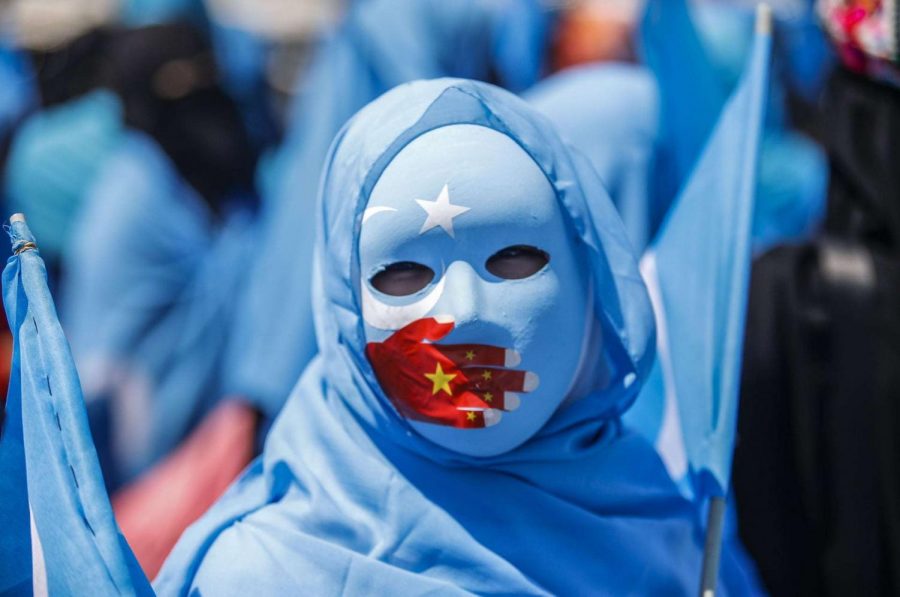Why the Lives of Uighur Muslims Weigh on America’s Shoulders
December 1, 2020
Imagine yourself being stripped away from not one, but several aspects of your identity. Speaking your native language. Wearing modest attire. Traveling to holy sites. Praying at your place of worship. These are only a handful of aspects that at least 3 million people have been forbidden to engage in. This is now the reality for the Uighur Muslims of China as they live and breathe through the world’s largest mass incarceration since the Holocaust.
According to BBC News, Uighurs are a predominantly Muslim and Turkic-speaking ethnic group with close cultural ties to Central Asia. There are Uighur communities located in Uzbekistan, Kyrgyzstan, and Kazakhstan; but a vast majority of 11 million Uighurs reside in Xinjiang, an autonomous region in China. In 1949, China gained control over Xinjiang, the territory formerly known as East Turkestan, and it has remained under Chinese leadership ever since.
After being annexed to China, Xinjiang attracted another ethnic group to the newly acquired region: the Han Chinese. Drawn by its abundance of resources and job opportunities, the Han migrated to Xinjiang under the government’s influence and eventually outnumbered the former Uighur majority. This dramatic shift in demographics created tension between both groups and resulted in the unjust treatment of Uighurs.
In retaliation, furious Uighurs protested their discrimination by the Hans and the new Xinjiang government. In 2017, NPR international correspondent Rob Schmitz reported, “Nearly 200 people were killed and more than 1,000 injured in riots in July 2009.” More unrest continued in the following years as Uighur terrorists planned attacks to kill members of the Han group.
Due to the violence initiated by Uighurs, the Chinese government was drawn to make a conclusion about their aggressive behavior. According to the Minaret Foundation, a non-profit organization advocating for issues concerning the Muslim community, “China views the Uyghurs’ religious and cultural identity as incompatible with their Communist ideals and fears they hold extremist and separatist ties.” Xinjiang officials began to surveil the Uighur population through facial and voice recognition, monitoring their internet usage, and restricting their national and international movement.
The attempts to oppress the Uighurs have only escalated in severity in recent years. In 2017, the Chinese established reeducation camps which they refer to as vocational training centers. Chinese officials claim that Uighurs voluntarily choose to participate in these “transformation” programs where learning that aligns with Communist ideology is taught. Reeducation camps were deemed necessary to counteract extremist views held by Uighurs which threatens China’s security, reported Bryan Wood of PBS NewsHour.
However, evidence from sources outside of China have suggested reeducation camps to not be what they seem.
Uighur men, women, and children of all ages are targeted and detained in one of 380 camps. “Most people in the camps have never been charged with crimes…. Often, their only crime is being Muslim,” stated author Lindsay Maizland of the Council on Foreign Relations, a nonpartisan organization dedicated to educating Americans on foreign policy issues. She explained that Uighurs are forced to pledge loyalty to the Chinese Communist Party and abandon their Islamic faith entirely. They are prohibited from daily prayers, eating halal food, fasting during Ramadan, celebrating Eid, and even greeting one another with “Salam.” Mimicking prison conditions, cameras and microphones constantly monitor the Uighurs’ every move. Some are interrogated, tortured, sexually abused, or even killed when discovered to be practicing Islam, Maizland added.
In 2019, twenty-two countries of the U.N. Human Rights Council authored a letter in which they pressured China to “refrain from the arbitrary detention and restrictions on freedom of movement of Uighurs.” Australia, Japan, and the UK are a few of the nations to support this action. In response to the letter, 37 other countries defended China’s treatment of Uighurs, emphasizing their success in shielding the country from “terrorism, separatism and religious extremism.” Signatories include the Muslim-majority countries of Egypt, Qatar, and Saudi Arabia.
The U.S. did not respond to the matter at hand with its fellow U.N. members but has condemned China on an independent level. According to news editor Alexandra Ma of Business Insider, “Both Democratic and Republican members of Congress have for months called on the White House to adopt human rights sanctions against Beijing, but those calls have not yet been answered.”
So why is it necessary for the U.S. to take legislative action? The U.S. is internationally perceived to be the “leader of the free world.” This powerful trope implies that America is the prime example of Western culture and numerous countries are following in its footsteps. They have substantial influence over decisions made by other nations, particularly with foreign policy. If the U.S. were to enforce sanctions against China, that would inspire countries who took initiative through the U.N. letter to pursue legislative action as well. With several U.N. members supporting the same cause, U.S.-led sanctions might even encourage countries who defended China to consider changing their perspective. The U.S. must formally respond to Xinjiang if they want the mass detention of Uighur Muslims to come to an end. The U.S. must lead the rest of the world toward ending the cultural genocide of Uighur Muslims before it becomes too late.











































